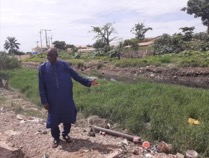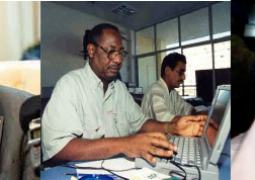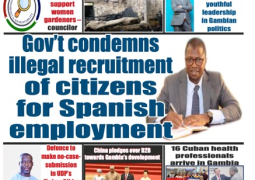
Talking to the residents in some of the compounds visited in the area, the former Banjul NAM said, although he is no longer their elected representative, he nonetheless felt obliged to visit and express genuine concern and solidarity in this time of difficulty and distress caused by the
inundation.
“I am coming here to commiserate and empathise with you and to also hear your concerns as well as assess the extent of the disaster in the aftermath of the flooding and see what one can do in terms of exploring possibilities," he added.
Mr. Sillah indicated that this is the second year running that the settlement of Tobacco Road bordering the other side of Banjul and the outlying swamps is experiencing inundation of water into its streets and homes.
“The same flooding occurred last year (2021) when I was the serving National Assembly Member for Banjul North Constituency where Campama Estate or Tobacco Road is situated but that this time around it is worst. In the previous one, the inundation affected only the compounds on the periphery or along the open canal that partly runs around the settlement. For this year, it is almost everywhere that got affected,” said the former lawmaker.
“Campama Estate or Tobacco Road is situated but that this time around it is worst. In the previous one, the inundation affected only the compounds on the periphery or along the open canal that partly runs around the settlement. For this year, it is almost everywhere that got affected,” said the former lawmaker.
He said it was revealed to him during the visit that many tenants have abandoned their inundated houses and relocated, albeit, reluctantly to the Kombos or other parts of the city whilst some were housed temporarily in the nearby schools. He added that the floodwaters have destroyed many household belongings, including furniture, mattresses, foodstuff, clothing, personal effects, etc.
According to the residents, they had been experiencing difficult days and nights when no one could venture outside of your house or compound without plunging into dirty water. Some families are recovering and slowly picking up from the devastation caused by the water that has now receded from the streets and compounds.
“It was a real nightmare during those difficult days and nights when we had to stay inside the filthy water that entered our sitting rooms, bedrooms, kitchens and toilets,” said Mariama Gassama, one of the victims, who briefly relocated to the Kombos but has now returned after the water cleared from their compound.
She said they could not cook for days as the floodwaters have claimed every part of their compound thus forcing all of them to relocate.
“I became very sick because of the overbearing stench of the filthy water inside our compounds and bedrooms that come from the open canal and sewage,” she added.
One Mr. Badjie explained that he was lucky that his house was spared during the flooding because it is a little above the water level inside their compound but added that he and his family dared not to venture outside as everywhere around was full of water.
“I was very worried with the children coming into contact with the dirty water which can cause an outbreak of disease as many of them were out and about roaming and playing in the streets as there is nowhere for them to go,” he lamented.
He admitted that it was very scary. He said it was as if the sea or River Gambia has transferred to Tobacco Road as they could see Tilapia fish, commonly called ‘Wass’, swimming everywhere and even inside their compounds. Aji Fatou, a landlady, who depends on the rent from tenants for her livelihood, expressed despair as all of them have relocated to the Kombos thus depriving her of such needed income.
Commenting on the response by government agencies, some women beneficiaries expressed their appreciation for having received rice, sugar and cooking oil from the National Disaster Relief Agency (NDMA).
According to them, some young people came to their compounds and recorded their details and contacts and after which they received a telephone call to go and collect foodstuff at Tesito or Alhaji Dawda Corr Street where the distribution took place.
Some of the residents also indicated that their details were recorded but have not been called yet to collect foodstuff. However, many have also claimed that they have not seen anybody coming to their compounds to collect information for the purpose of providing them with relief. According to some, they have seen groups coming to their streets but skipping their compounds.
This visit, according to Mr. Sillah, is partly prompted by the interest expressed by some well-meaning personalities who are willing to contribute towards any relief effort to be undertaken by him for the victims of the inundation in Banjul North Constituency.





